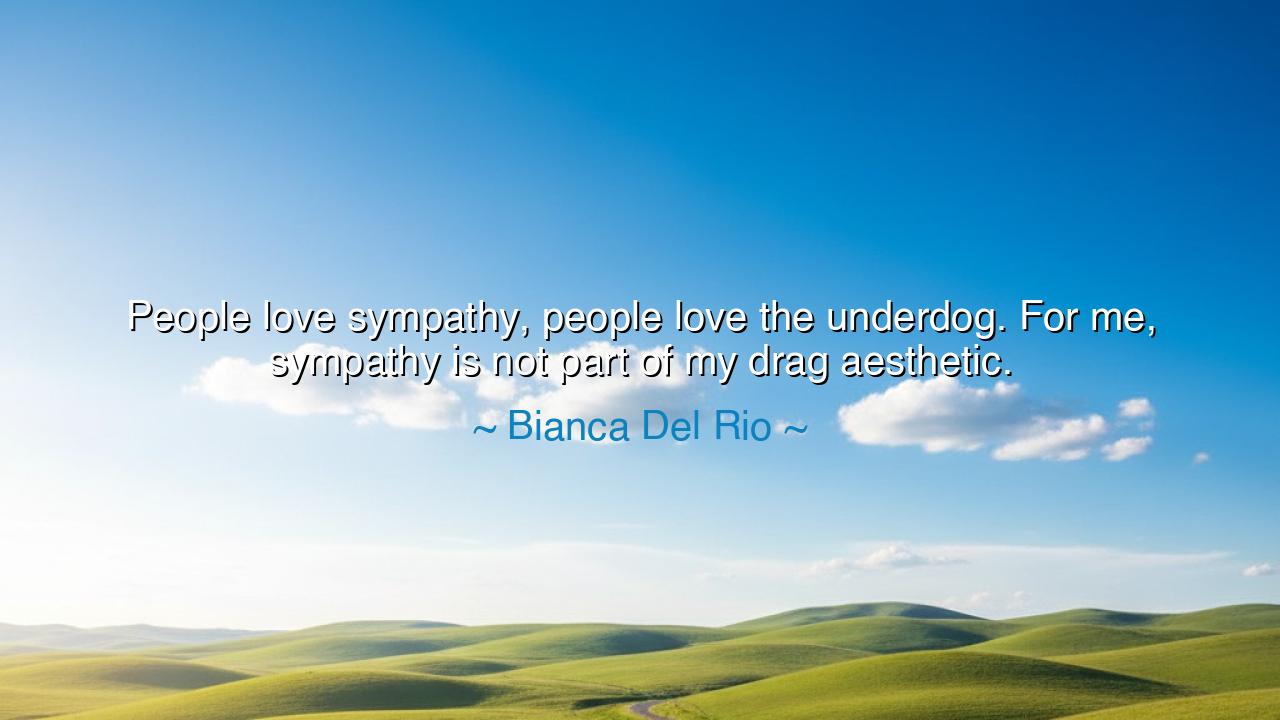
People love sympathy, people love the underdog. For me, sympathy
People love sympathy, people love the underdog. For me, sympathy is not part of my drag aesthetic.






Children, gather close and listen to the words of Bianca Del Rio, a fierce and unyielding force in the world of drag: "People love sympathy, people love the underdog. For me, sympathy is not part of my drag aesthetic." These words speak to a profound and ancient truth about how we perceive strength, vulnerability, and the human spirit. Sympathy—that emotion we feel when we pity or feel sorry for another—often carries a heavy weight in society, as it directs us to see others through the lens of their suffering. But Bianca Del Rio teaches us that true power is not born from the sympathy of others, nor is it found in portraying oneself as a mere victim of circumstance. No, true strength comes from standing tall with unwavering confidence, from demanding respect not through pity but through self-assurance and authenticity.
Consider the ancient warriors of old, like Achilles, the great hero of the Iliad, who was not a figure of sympathy but of immense strength and pride. Achilles did not seek the pity of others nor did he portray himself as an underdog. His strength was not about suffering in silence, but about standing firmly in his own power, knowing his worth and never allowing others to see him as anything less than a hero. Just as Achilles would rather face death than live without honor, so too does Bianca Del Rio reject the notion that vulnerability, pity, or sympathy are necessary for greatness. Strength comes not from how others perceive you, but from how you choose to present yourself to the world.
Sympathy, children, can be a double-edged sword. While it may seem compassionate, it often creates a dynamic of inferiority, one where the person receiving sympathy is seen as less than those offering it. The ancient Greeks understood this well, for they valued the concept of arete—excellence and virtue. To show weakness or to seek pity was not to show greatness, but to accept the illusion of inferiority. Bianca Del Rio, like those ancient heroes, rejects this illusion, choosing instead to stand firm in the belief that true greatness comes from confidence, from being unapologetically yourself, without needing the validation of others’ pity or sympathy.
Think, children, of Spartacus, the gladiator who led a rebellion against the might of Rome. Though he was born into servitude, Spartacus did not seek sympathy for his condition. He did not live as the underdog in the traditional sense, always fighting to survive. Instead, he rose as a leader, rallying the oppressed to fight for their freedom, not through the compassion of others, but through their shared strength and determination. His legacy is not one of weakness, but of courage and resolve, and it is through this resolve that he became a symbol of empowerment—not pity. His story teaches us that true power is found not in how others feel about you, but in how you see yourself and how you act upon that self-belief.
In the world of drag, Bianca Del Rio has chosen to reject the traditional narrative of the underdog—the figure who must struggle and endure in order to gain sympathy from others. Instead, she presents herself as an unapologetic force, embracing the art of drag as an act of empowerment. Her aesthetic is not about seeking the validation of the audience through sympathy, but about demanding respect through the strength of her persona. She teaches us that identity is not about playing the role of the victim, but about standing in our full power, knowing that our worth does not depend on the sympathy of others.
The lesson here, children, is one of self-respect and authenticity. Do not seek the approval of others through pity or sympathy, for it is a fragile foundation upon which to build a life. Sympathy may come when you are in need, but true strength comes when you choose not to be defined by your struggles or the pity of others. Like Bianca Del Rio, like Achilles, and like Spartacus, you must find the courage to stand tall, to embrace who you are fully, and to demand respect through your own confidence and power. It is through this that you will carve a legacy—not one based on the sympathy of others, but on the strength of your authentic self.
So, children, as you move through life, remember that sympathy does not define your worth. The true test of your strength is not how much others pity you, but how you carry yourself, how you meet the world with unapologetic confidence, and how you assert your value. Seek not the sympathy of others, but the respect that comes from being true to who you are. Stand firm in your power and let your actions speak louder than any pity ever could. In doing so, you will live a life not of weakness, but of greatness and authenticity.






AAdministratorAdministrator
Welcome, honored guests. Please leave a comment, we will respond soon